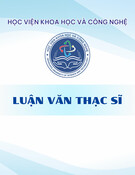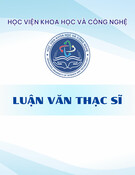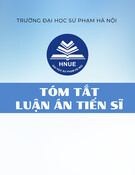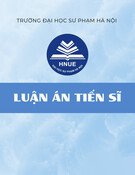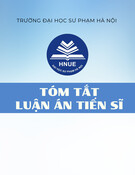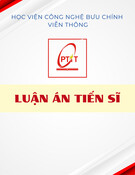
evaluating creative competence in general, and evaluating creative competence in creating
argumentative writing in high schools.
- In practice: The thesis proposed assessment standards of creative competence in
creating argumentative writing, and designed open-ended questions to evaluate the creative
competence in creating argumentative writing used in two forms of regular assessment and
periodical assessment, contributing to the goal’s achievement of developing learners’ dignities
and competence according to the requirements of the 2018 General Education Curriculum in
the Literature subject.
8. Thesis structure
In addition to the introduction, conclusions and recommendations, references, and
appendix, the thesis is structured into 03 chapters.
Chapter I - Theoretical basis of assessment of creative competence in creating
argumentative writing of high school students
Chapter II - Development of assessment standards and assessment tools of creative
competence in creating argumentative writing of high school students
Chapter III - Pedagogical experiment
CHAPTER 1. THEORETICAL BASIS OF ASSESSMENT OF CREATIVE
COMPETENCE IN CREATING ARGUMENTATIVE WRITING OF HIGH SCHOOL
STUDENTS
1.1. Overview of issue research
1.1.1. Studies of creative competence
By studying a number of research works of foreign authors such as J.P. Guiford,
Holland (1959), Blom, Getzels, L.X. Vygotsky, M.N. Sacdacop, G. Polia, E.P. Torrance, May
(1961), Mackinnon D.W, Yahamoto (1963), E.P. Torrance (1965), Barron, Blom, Getzels,
Helmholtz,... and some Soviet (former) authors such as A.N. Luck, V.N. Pushkin, B.M.
Kedrop, M.G. Larosepsky, G.S. Klostul and N.A. Mensinxkaia, X.L. Rubinstein, X.L.
Vygosky, N.G. Alexayep, Ia. Derner, E.M. Maiarski…. and in Vietnam such as Phan Dung
(1992); Pham Van Hoan (1967); Nguyen Canh Toan, Nguyen Van Le, Chau An (2004), Le
Hai Yen (2008), Nguyen Trong Hoan (2016), Nguyen Ba Kim, Vu Duong Thuy, Nguyen Ke
Hao, Vu Quoc Chung, Tran Hiep, Do Long, Ton Than, Tran Luan, Nguyen Huy Tu, Duc Uy
Tran Tuan Lo, Huynh Van Son (2009), Tran Viet Dung (2013), Tran Thi Bich Lieu (2013),
Pham Thi Bich Dao (2014), Hoang Hoa Binh (1997), Nguyen Thi Hong Van (2017),... it can
be seen that the issues of creative competence are studied mainly in the psychological aspect as
creative thinking, and studied primarily on conjunction with other issues, in many different
scientific fields. There is still a lack of applications in each specific area, not going into the
study of the structure, nature, characteristics and working mechanism of creative thinking. The
studies on creative competence in the Literature subject are the necessary suggestions so that
the author can continue to delve into the study of creative competence in each specific content
circuit of the subject.
1.1.2. Studies of creative competence in creating argumentative writing
Related to this issue, we conducted a research on several authors’ works, such as Katie
Larsen MacClarty and Matthew N. Gaertner (2015), Barbara E. Walvoord, Melanie Williams,






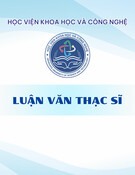
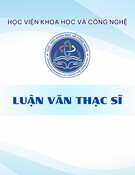
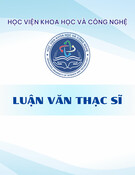
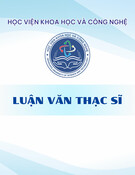
![Luận văn Thạc sĩ: Tổng hợp và đánh giá hoạt tính chống ung thư của hợp phần lai chứa phần tetrahydro-beta-carboline và imidazo[1,5-a]pyridine](https://cdn.tailieu.vn/images/document/thumbnail/2025/20250816/vijiraiya/135x160/26811755333398.jpg)
